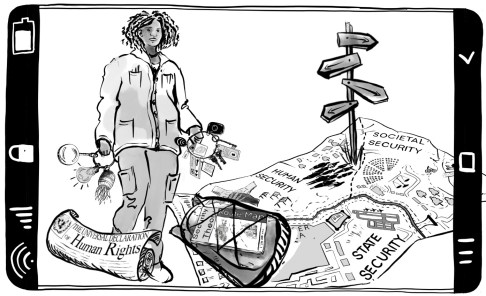Inclusive Security
March 4, 2021 by aliceangus · Comments Off on Inclusive Security

We have been collaborating with Professor Lizzie Coles Kemp, (of the Information Security Group, Royal Holloway University) and the communities she works with, for several years, on projects about bias, access, security, exclusion, privacy and consent in digital services. Lizzie is groundbreaking, and inspiring, in the way she collaborates with communities, artists and performers in this work.

Recently I’ve been excited to be working with her using my process of ‘drawing as research’, to reflect on her work, and to bring in moments, expressions and feelings that are sometimes beyond words. It’s is not about me illustrating the research; my drawing and Lizzie’s writing inform and influence each other as an iterative creative process. Some drawings only exist temporarily to explore an idea, but many develop into final works.
The first set of drawings were part of Lizzie’s Inaugural Lecture “Digital security for all: why an inclusive security approach matters”. More recently she commissioned a large collection in response to her significant body of research on the way our interactions with digital technologies are shaped; her call to recognise the political and social power of security technologies; and to reform them in terms of trust, inclusion and reciprocity. They were created around exchanges we had during the writing of her book “Inclusive Security: Digital Security Meets Web Science” – (part of the Foundations and Trends® in Web Science series by Now Publishing). Many of them appear in the book and together they form a large body of artwork Lizzie can draw on for publications, teaching, lectures, and events.
“Alice’s artwork draws out the complex and contradictory details of everyday life. Every line in her drawings writes back in the feelings and experiences of technological security use that academic writing so often struggles to articulate.” Lizzie Coles Kemp

“Digital security for all: why an inclusive security approach matters”
“Digital security for all: why an inclusive security approach matters.”
Civic Agency
November 7, 2020 by Giles Lane · Comments Off on Civic Agency

Civic Agency is an initiative for engaging people at all levels of society with the social, cultural, economic and political issues at the heart our our increasingly automated and divisive world:
- How are decisions made and justified that affect us in ways we are often unaware of?
- Who designs these systems and what are the choices they make?
- Why are they necessary? and,
- In what ways can they become transparent as to purpose, intention and consequence?
We must find new strategies for everyone to be able to navigate the implications for our futures as we become ever more reliant on digital systems and technologies to run everyday life. As we spend more and more time interacting online and generating data about ourselves and our behaviours to be harvested by corporations and governments, so we need alternative spaces to challenge and speak truth to power and control.
Proboscis’ work for over two decades has focused on introducing creative tools and artistic methods into unusual places and situations – where they may help produce alternative ways for people to acquire agency for themselves and to feel empowered to share their voices, and their values. Since 2001 we have done this under over-arching research themes. From 2020 Civic Agency will be our theme, inter-weaving through our projects and activities and building upon all our previous work and ideas.
The theme originates in an idea that emerged from our participation in the UnBias research project on algorithmic bias (2016-18), for which we created a Fairness Toolkit aimed at helping young people and other non-technology-experts (i.e. ordinary folk) build their awareness and understanding of what bias in algorithms is and how it affects them and their communities. In 2019 Giles Lane outlined a vision for how we might build upon that concept and expand it into a national programme. In 2020, Proboscis was commissioned to develop a companion toolkit that would help organisations developing and deploying AI and algorithmic systems implement practical and pragmatic ethics assessments using a whole systems approach.
Over the next few years we plan to develop the partnerships and collaborations necessary to turn the vision of civic agency into a practical (and trans-national) programme that engages all kinds of people in all kinds of places with ways in which they can interrogate the systems of power that authorise the use of automated decision making in our societies. A programme that stimulates critical and civic thinking; that offers trajectories for resistance to authoritarianism and, that can be a platform for stimulating new forms of transparency and intervention.
Artists of all kinds often serve as society’s visionaries – thinking the unthinkable, exploring the impossible and making our own paths rather than following the established tracks. We are pioneers and explorers – seeking out new vistas and experiences and relaying them to others through the media of our creations. The discoveries we make and bring back become the tangible forms that others can be inspired by and act upon themselves. Creativity and artistic expression are powerful ways for people to take agency for themselves and to feel empowered to have and share their voices. We see this as a vital counter-balance to the increasingly pervasive systems of automated decision making in everyday life.

